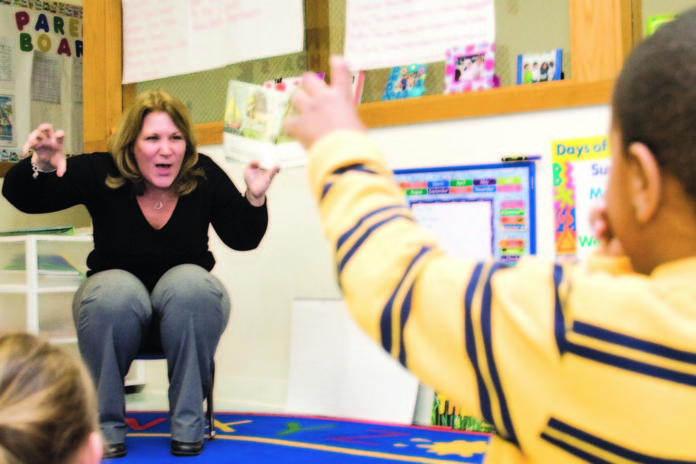
Curriculum ranges from training to grad degrees
Early childhood educators are feeling the same squeeze as elementary and secondary educators when it comes to improving how they prepare children for standardized testing.
“I know in the field of early care … quality is a huge focus,” said Patty Carbone, child care director at Child & Family Services of Newport County. “You can tie it into No Child Left Behind … we’re definitely under the microscope right now.”
Children as young as 4 years old have specific standards they must meet, Carbone said.
That’s why she spearheaded efforts to get professional development training for teachers and staff at CFS. She said she wanted to ensure her staff was delivering the utmost quality to the six-month-olds to 5-year-olds whom the private nonprofit services.
Carbone said she chose Johnson & Wales University’s new Institute for Early Childhood Leadership and Professional Development for the training because of the reputation of the institute’s director, Bill Strader, who has more than 30 years of experience in early childhood education. He spent a year and a half developing the institute, which was launched in September.
Strader created a year-long professional development program for CFS.
The program focuses on a variety of topics in which the nonprofit had expressed interest, he said. One was the importance of play.
“He inspired the teachers to think differently about [play],” Carbone said.
Strader taught them that play is not just about playing, she said.
It’s about the development of language skills, motor skills and social skills.
“Society today is placing so much emphasis on academics, not on play,”
Carbone said. “Children learn about their environment through play.”
Strader said the institute tailors its professional-development programs to the needs of the organization requesting training.
For example, the program he is developing for the R.I. Department of Children, Youth and Families focuses on the quality components of an excellent program. Quality components include the quality of interactions between children and staff and opportunities for children to be involved in exploration, he said.
In addition to the professional-development workshops, the institute offers a master of education degree in early childhood administration and leadership.
Johnson & Wales added the degree because it wanted to make the School of Education well-rounded in its offerings, Strader said. The school already offers a master of arts in teaching, which addresses needs of educators pursuing credentials to teach in kindergarten through 12th grade.
The master of education in early childhood focuses on making administrators and directors of early childhood programs leaders in their profession, Strader said. The nationally accredited program teaches participants about deciphering state regulations, about licensing and public policy, and how to develop and mentor staff.
There are now 14 students in the two-year program, Strader said. About 80 percent of them are currently directors or administrators of early childhood education programs.
Carbone is one of them. She said that, in addition to teaching them to be leaders, the program helps participants to better understand issues they already handle.
“It’s given me the opportunity to look at what I know and expand upon it,” she said. “We’re asked to find something important to us in our daily job … research it … and put it together in a presentation.”
One of the things that attracted her to the program was its rarity, she said. There aren’t very many programs that target the directors and administrators of early childhood programs. Strader said he knows of only eight to 10 others like it in the country.
And Carbone also served on the committee that helped develop the curriculum for the program.
“It’s going to open doors for us,” she said. “With my master’s, I could be a consultant. I could be a teacher of one of [the institute’s] workshops.”










